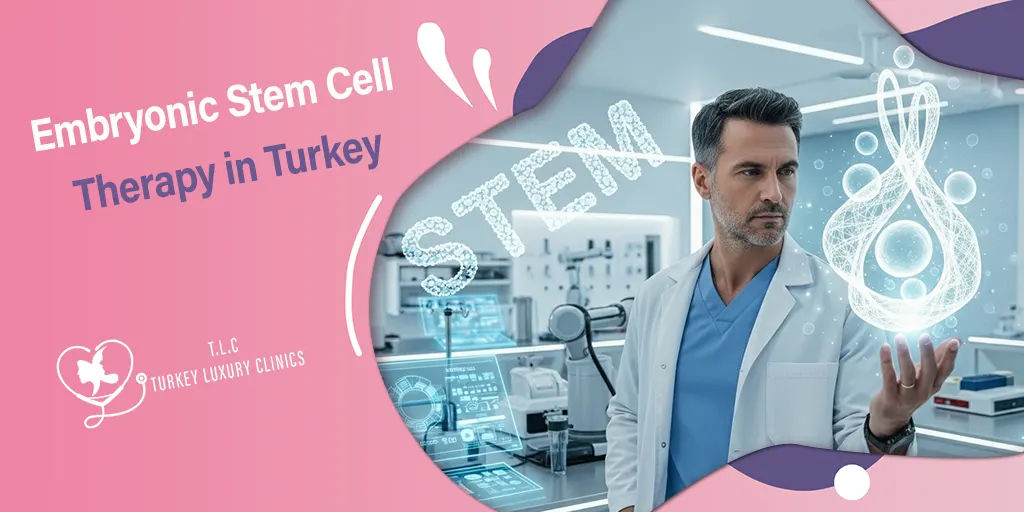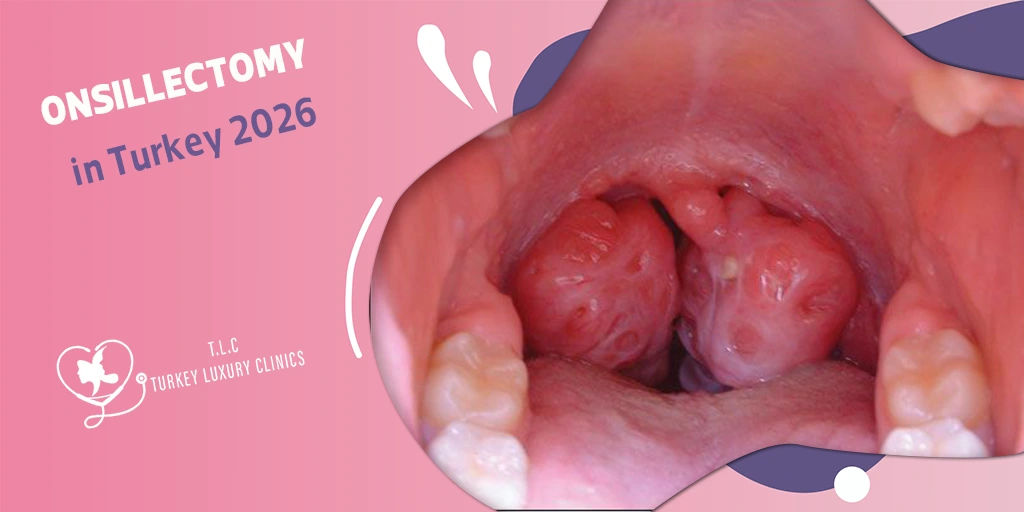- - What is Embryonic Stem Cell Therapy?
- - How Do Embryonic Stem Cells Work?
- - Benefits and Advantages of embryonic stem cell therapy
- - Therapeutic Applications of Embryonic Stem Cell Therapy
- - Process of Embryonic Stem Cell Therapy
- - Risks and Side Effects of Embryonic Stem Cell Therapy
- - Embryonic Stem Cell Therapy Pros and Cons
- - Non Embryonic Stem Cell Therapy
- - Embryonic Stem Cell Therapy Cost
- - Embryonic Stem Cell Therapy Cost in various countries
- - Challenges and Ethical Considerations of Embryonic Stem Cell Therapy
- - Is Embryonic stem cell therapy licensed in Turkey?
- - Why Choose Turkey for Stem Cell Therapy?
- - Get Advanced Embryonic Stem cell therapy with Turkey Luxury clinics
- - FAQs About Embryonic Stem Cell Therapy
Discover cutting-edge embryonic stem cell therapy in Turkey. Explore applications, benefits, costs, and why Turkey is a top destination for regenerative medicine.
Embryonic Stem Cells offer a broader range of therapeutic applications due to their pluripotent ability to differentiate into almost any cell type.
In Turkey, advanced stem cell therapies, including those using embryonic stem cells, represent a promising frontier in regenerative medicine, offering potential for more versatile and effective treatments.
What is Embryonic Stem Cell Therapy?
Embryonic stem cell (ESC) therapy is a modern regenerative medicine for treating a wide range of diseases by using pluripotent stem cells derived from 3- to 5-day-old human embryos to potentially repair damaged or diseased tissues by differentiating into specialized cell types, such as heart, nerve, or blood cells.
Unlike adult stem cells, which usually differentiate into cell types similar to the tissue they originate from, embryonic stem cells have a much greater potential because they are pluripotent and can form almost any type of tissue in the body.
How Do Embryonic Stem Cells Work?
When embryonic stem cells are introduced into damaged tissue, they have the ability to divide, develop, and differentiate into the specific cell types needed in that area. Once they take on their specialized form, they integrate with the surrounding tissue and begin to function like native cells.
This unique capacity to replace diseased or injured cells makes ESCs highly valuable for potential therapies in fields such as neurology, cardiology, orthopedics, and regenerative medicine more broadly.
Benefits and Advantages of embryonic stem cell therapy
The main benefit of human embryonic stem cell therapy lies in its unique ability to multiply into any cell type, making it possible to regenerate and repair damaged tissues and organs. This not only promotes natural healing but also reduces inflammation and enhances overall recovery.
Advantages of Embryonic Stem Cell Therapy
- Tissue Regeneration: Ability to develop into various cell types, enabling the growth of new, healthy tissues and potentially even organs.
- Pain Relief: By addressing the underlying cause of disease or injury, stem cells help ease chronic pain and improve quality of life.
- Accelerated Healing: Supporting the body’s repair mechanisms for faster recovery.
- Reduced Risk: Minimally invasive compared to many traditional surgical procedures
Therapeutic Applications of Embryonic Stem Cell Therapy
Human embryonic stem cell transplantation therapy offers broad therapeutic potential in regenerative medicine for diseases like Parkinson's, diabetes, heart failure, and spinal cord injuries by differentiating into specific cell types to repair damaged tissues.
1. Embryonic Stem Cell Therapy for Diabetes Mellitus
ESCs can be directed to become insulin-producing pancreatic beta cells. When transplanted, these cells can help restore insulin secretion and regulate blood sugar levels, offering new hope for diabetic patients.
While the therapy holds promise for a long-term cure, further research is needed to address risks such as immune rejection and tumor development.
2. Embryonic Stem Cell Therapy for Macular Degeneration
In macular degeneration, the central part of the retina becomes damaged, impairing detailed vision. ESCs can be differentiated into retinal pigment epithelial (RPE) cells and transplanted into the eye. These new cells can replace damaged tissue and potentially restore lost vision.
3. Embryonic Stem Cell Therapy for Osteo-degenerative Diseases
For conditions like osteoarthritis, ESCs may support cartilage repair by forming new tissue and releasing anti-inflammatory molecules. This could slow disease progression, reduce joint pain, and improve mobility, though the therapy remains experimental.
4. Embryonic Stem Cell Therapy for Cancer
Research is exploring how ESCs might help target cancers such as leukemia, breast cancer, and colon cancer. By generating immune or supportive cells, they may enhance anticancer therapies. However, clinical applications are still in early phases and require extensive safety evaluation.
5. Embryonic Stem Cell Therapy for Kidney Failure
ESCs can differentiate into kidney-like cells that may help regenerate damaged kidney tissue. This approach could improve kidney function, reduce complications, and delay the need for dialysis or transplant, though it is still under investigation.
6. Embryonic Stem Cell Therapy for Neurodegenerative Disorders
ESC-derived neurons can replace cells lost in diseases such as Parkinson’s and spinal cord injuries. These transplanted neurons may restore connections in the nervous system, improving mobility, coordination, and cognitive function.
7. Embryonic Stem Cell Therapy for Cardiovascular Diseases
Cardiomyocytes (heart muscle cells) derived from ESCs can be transplanted into damaged hearts following a heart attack. These cells integrate with existing tissue, helping repair damaged areas and enhance overall cardiac performance.
8. Embryonic Stem Cell Therapy for Liver Diseases
Because of their ability to generate hepatocytes, ESCs hold promise for liver regeneration. Transplanting these cells could support recovery in patients with liver failure or chronic liver disease, reducing the need for donor organ transplants.
9. Embryonic Stem Cell Therapy for Multiple Sclerosis
In multiple sclerosis (MS), ESC therapy is being studied to replace damaged neural cells and to “reset” the immune system, making it less likely to attack myelin. While results show potential in reducing relapses, the therapy still carries risks of complications and is experimental.
10. Cosmetic Applications of Stem Cell Therapy
Although cosmetic treatments typically use adult stem cells rather than ESCs, stem cell therapy has found applications in aesthetics. It can stimulate skin regeneration, reduce wrinkles, improve skin texture, minimize scarring, and even promote hair follicle growth in cases of hair loss.
Process of Embryonic Stem Cell Therapy
Embryonic stem cell therapy involves: obtaining the pluripotent embryonic stem cells (ESCs) from a blastocyst, processing them in a lab to create stable, homogenous cell lines, directing their differentiation into specific cell types needed for treatment using growth factors and other cues, and then delivering these specialized cells into the patient to repair damaged tissue.
Risks and Side Effects of Embryonic Stem Cell Therapy
Embryonic stem cell therapy carries several potential risks that patients should be aware of. 1. Risk of tumor formation: Since ESCs have a high capacity for uncontrolled growth, resembling cancer cells.
2. Risk of immune rejection: If the body may recognize the transplanted cells as foreign and attack them.
3. Risk of infection: The procedure itself also carries risks of infections, as it involves invasive techniques.
4. Additionally, there is the risk of transmitting adventitious agents (such as viruses or microbes) during the cell manufacturing process if not carefully controlled.
Embryonic Stem Cell Therapy Pros and Cons
| Pros (Advantages) | Cons (Disadvantages) |
| Versatility: ESCs are pluripotent and can differentiate into any cell type in the body. | Ethical Concerns: Use of human embryos raises strong ethical and moral debates. |
| Therapeutic Potential: Can potentially treat diseases like Parkinson’s, Alzheimer’s, type 1 diabetes, multiple sclerosis, and spinal cord injuries. | Immune Rejection: Risk of the patient’s immune system rejecting transplanted cells, requiring immunosuppressive drugs. |
| Tissue Regeneration: Ability to replace or repair damaged tissues and organs. | Tumor Formation (Teratocarcinomas): ESCs may form tumors if not fully differentiated before transplantation. |
| Advancement of Research: Provides a powerful tool to study human development and test new drugs without direct human trials. | Regulatory Gaps: Lack of unified international regulations may result in unsafe or unproven therapies. |
| Innovative Medicine: Opens the door for next-generation regenerative medicine and personalized treatments. | Cost and Accessibility: Very expensive therapies, often not covered by insurance, limiting access for many patients. |
| Technical Challenges: Difficulty in producing large numbers of specific, functional cell types (e.g., cardiomyocytes) for clinical use. |
Non Embryonic Stem Cell Therapy
Non-embryonic stem cell therapy utilizes adult stem cells—such as hematopoietic stem cells (HSCs), mesenchymal stem cells (MSCs), or induced pluripotent stem cells (iPSCs)—instead of embryonic stem cells to treat diseases and injuries. Adult stem cells are naturally found in developed tissues and organs, while iPSCs are reprogrammed cells that mimic embryonic stem cells but are derived from the patient’s own body.
Is adult stem cell therapy better than embryonic?
Adult stem cells and iPSCs offer clear ethical advantages and carry a reduced risk of immune rejection. They are also FDA-approved for use in bone marrow transplants and are being extensively studied for a wide range of regenerative applications.
However, embryonic stem cells still hold an important advantage over adult stem cells and iPSCs: they are more diverse and highly potent, with the unique ability to differentiate into virtually any type of tissue. This makes them especially promising for more versatile and potentially effective therapeutic applications.
Embryonic Stem Cell Therapy Cost
The cost of embryonic stem cell therapy can vary widely depending on the clinic and treatment plan. On average, a single treatment ranges between $10,000 and $20,000 in the USA.
Several factors affect the price, including the patient’s condition, the clinic’s location, the number of sessions required, the type and quantity of stem cells used, and the expertise of the medical team.
Because embryonic stem cells require complex isolation and handling, their treatments are generally more expensive than other types of stem cell therapies. For comparison, bone marrow stem cell therapy usually costs $4,000–$8,000, while mesenchymal stem cell treatments often range from $5,000 to $25,000 or more.
Cost of Embryonic Stem Cell Therapy in Turkey:
The cost of stem cell therapy in Turkey ranges from $2,000 to $30,000 or more, depending on the type of treatment. Embryonic stem cell (ESC) therapy is usually the most expensive option because of the complexity of extraction and purification. In Turkey, ESC treatments typically start at $5,000, with prices varying based on the patient’s condition and the specific application.
For example, stem cell therapy for hair transplants usually costs between $2,000 and $4,000. For more severe conditions such as chronic diseases, advanced stem cell transplants can be much higher, sometimes reaching $50,000.
Many clinics in Turkey also provide comprehensive medical packages, which make treatment more affordable and convenient for international patients. For instance, an all-inclusive package for stem cell therapy for arthrosis can cost around $7,500, covering medical expenses, consultations, the procedure, and aftercare. In addition, some packages also include non-medical expenses such as accommodation, transportation, and even airfare.
| Type of Stem Cell Therapy | Approximate Cost (USD) |
| Orthopedic Stem Cell Therapy | $3,000 – $6,000 |
| Neurological Stem Cell Therapy | $5,000 – $10,000 |
| Cardiovascular Stem Cell Therapy | $4,000 – $8,000 |
| Stem Cell Therapy for Diabetes | $6,000 – $12,000 |
| Cosmetic Stem Cell Therapy | $3,500 – $7,000 |
| Spinal Cord Injury Stem Cell Therapy | $8,000 – $15,000 |
Embryonic Stem Cell Therapy Cost in various countries
| Country | Average Cost Range |
| India | $2,000 – $6,000 |
| Turkey | $2,000 – $15,000 |
| Thailand | $3,000 – $13,000 |
| Mexico | $3,500 – $15,000 |
| Colombia | $5,500 – $14,000 |
| South Korea | $10,500 – $42,000 |
| Canada | $15,000 – $50,000 |
| United States | $20,000 – $50,000+ |
Challenges and Ethical Considerations of Embryonic Stem Cell Therapy
Embryonic stem cell therapy is still experimental and faces scientific and ethical challenges. Major issues include high costs, slow progress in clinical trials, and a lack of standardized protocols for quality and evaluation.
Despite its promise, regenerative medicine remains in early stages, requiring further research to ensure long-term safety and effectiveness.
Ethical considerations include the use of human embryos, which raises moral concerns and has led to strict regulations in many countries.
Is Embryonic stem cell therapy licensed in Turkey?
Yes, Embryonic stem cell therapy is licensed and regulated in Turkey under the oversight of the Ministry of Health. The ministry sets strict guidelines for clinics and laboratories to ensure patient safety and treatment efficacy, including rules on which cell types can be used and the standards for cell processing facilities
Why Choose Turkey for Stem Cell Therapy?
1. Cost affordability: Compared with Western countries, the cost is noticeably lower, yet clinics maintain international standards of safety and care.
With comprehensive packages offered by many hospitals and clinics include not just the procedure, but also medical examinations, follow-up care, accommodation, and transfers, giving patients a clear understanding of the total cost from the start.
2. Beyond pricing, Turkey is home to advanced medical facilities and the internationally certified and highly trained specialists who provide personalized treatment plans.
Patients benefit from cutting-edge regenerative medicine techniques in modern clinics that prioritize both medical quality and patient comfort.
3. For many international patients, this combination of affordability, transparency, and advanced care makes Turkey one of the most attractive destinations for stem cell therapy worldwide.
Get Advanced Embryonic Stem cell therapy with Turkey Luxury clinics
Contact us today to schedule a consultation and explore personalized treatment options with our expert medical team.











.webp)
.webp)
.webp)
.webp)

